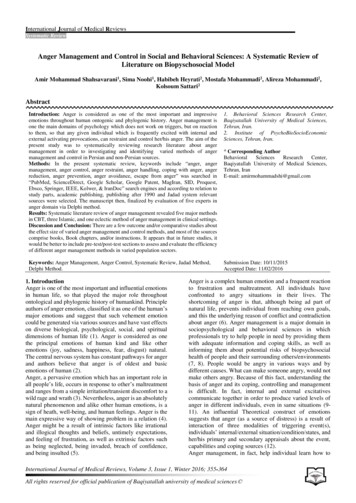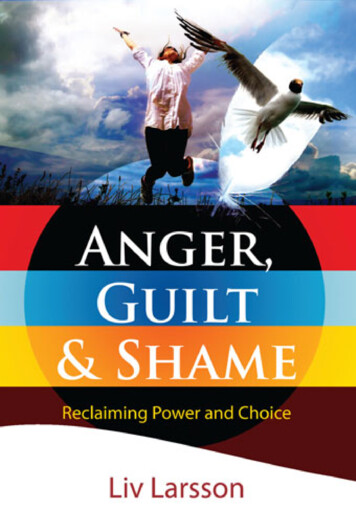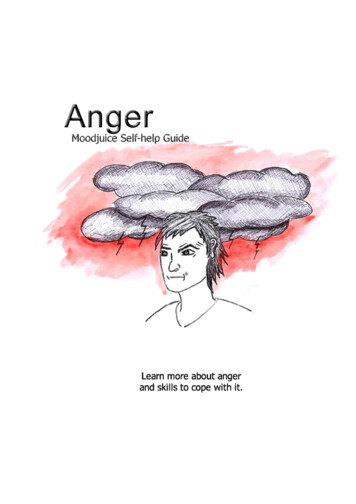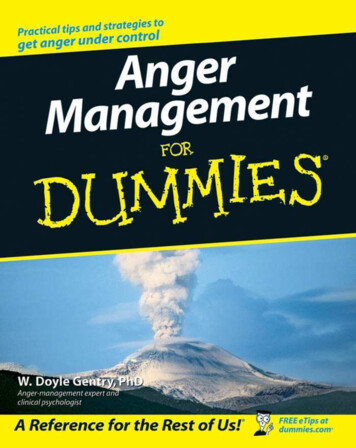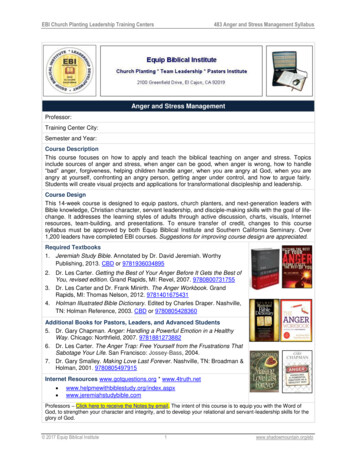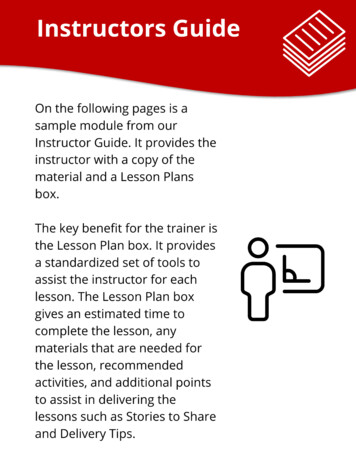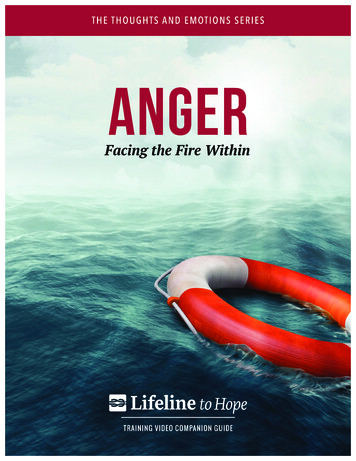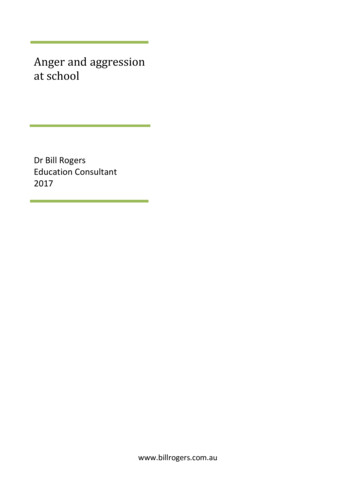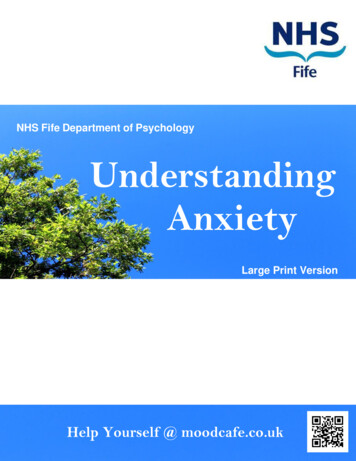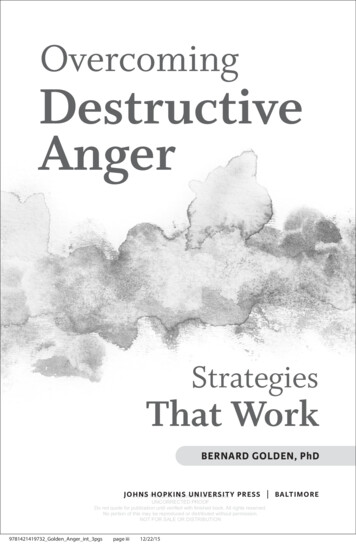
Transcription
OvercomingDestructiveAngerStrategiesThat WorkBERNARD GOLDEN, PhDjohnshopkinsuniversitypress baltimore 2016 TheJohns HopkinsUniversity PressUNCORRECTED PROOFDo not quote for publication until verified with finished book. All rights reserved.No portion of this may be reproduced or distributed without permission.NOT FOR SALE OR DISTRIBUTION9781421419732 Golden Anger int 3pgs page iii 12/22/15
PrefaceAnger is a highly charged emotion that’s often difficult to understand. Destructive anger— especially if it has led to physical violence— can significantly strain relationships. By selecting this book, you’ve shown that youare well aware of its impact. Perhaps you blame your temper for a severedrelationship with a family member, partner, or friend. Maybe your quickness to anger has caused you to lose a job or has endangered your career.Or, if you have children, your outbursts may have led them to withdrawfrom you in fear. Whatever the case may be, the greatest test when dealingwith anger is to keep it from overwhelming you.Few people have received instructions on how to manage anger constructively. As such, they often find it challenging. Regardless of how youcurrently handle your anger, Overcoming Destructive Anger: Strategies ThatWork will teach you the skills to address your challenges and answer yourmost trying questions. This book offers strategies to overcome anger that is overly intense, occurs frequently, lasts a long time, and is difficult to let go.Overcoming Destructive Anger trains you to recognize and control thetriggers that lead to anger. It will help you not only to overcome destructive anger but also to practice healthy anger on a regular basis. You’ll learnhow to react less to anger, how to identify the unmet needs and desiresthat contribute to your anger, and how to relate to others so that you morereadily meet these needs and desires.My enduring interest in anger as an adult has been influenced, in part,by my own difficulties with anger as a child. Fortunately, my anger neverresulted in serious harm to anyone. However, I did find myself quick toanger on several occasions when it could have caused serious injury andpain to others.On one occasion, when I was eight years old, I had an altercation withmy older brother. At the time, we lived in an apartment on the second 2016 The Johns Hopkins University PressUNCORRECTED PROOFDo not quote for publication until verified with finished book. All rights reserved.No portion of this may be reproduced or distributed without permission.NOT FOR SALE OR DISTRIBUTION9781421419732 Golden Anger int 3pgs page vii 12/22/15vii
viii Prefacefloor of a four- story building. We were home alone, and my brother hadbeen teasing me about something. We began to wrestle with each other.He straddled my chest, held my hands to the floor, and pinned me down.I couldn’t find the strength to get him off, so I yelled as loud as I could. Tobe honest, I intended to embarrass him by alerting the neighbors. Afterwrestling and screaming for a few more minutes, however, I gave up andshouted “Uncle!” and he finally released me.I may have appeared calm on the outside, but inside, I was furious. AsI slowly walked away, I grabbed the heaviest shoe I could find and threw itat my brother’s head. With an enviable display of quick reflexes, he ducked.The shoe, however, continued its flight, shattering one of our living roomwindows and hitting the street below— along with pieces of glass.I remember immediately feeling ashamed. I had broken the windowand destroyed the set of blinds that had covered it, and I feared that theshards of glass might have fallen on someone below. That particular window, you see, was right above the entrance to our building. When I lookedout another window, I fully expected to see someone injured as a result ofmy impulsive anger. Luckily, no one was entering or leaving the buildingat that moment.This was just one in a series of events that helped me recognize mydifficulty with anger and how quickly I could move from feeling annoyedto experiencing rage. Fortunately, I was also both highly self- conscious andreflective. Perhaps these were early signs of my becoming a therapist.I eventually vowed to better control my anger, but I usually ended upstifling and trying to ignore it. I had somehow concluded that I shouldn’tshow or even feel anger. As a result, my anger often escalated until I’dverbally explode and take it out on the next person or situation to causeme additional grief.Years later, as a young adult, I taught in an elementary school in theSouth Bronx. During my six years there, I became interested in better understanding the children’s anger as well as my own. I obtained my master’sdegree in psychology, then returned to school full- time for my doctoral degree. For several years afterward, I worked in a psychiatric inpatient setting. I developed workshops to help patients comprehend and control theiranger. These early experiences helped me develop the approach I presentin this book.In the 1980s, I began offering workshops on anger management to 2016 The Johns Hopkins University PressUNCORRECTED PROOFDo not quote for publication until verified with finished book. All rights reserved.No portion of this may be reproduced or distributed without permission.NOT FOR SALE OR DISTRIBUTION9781421419732 Golden Anger int 3pgs page viii 12/22/15
Preface ixschools, parents, and businesses, while working in both outpatient andinpatient settings. I’ve offered monthly classes on anger management since1994. Additionally, at my private practice, I focus on individual counselingand psychotherapy for the practice of healthy anger.Overcoming Destructive Anger is for people of all ages. It offers excitingnew approaches to anger management that have been developed since my2003 book, Healthy Anger: How to Help Children and Teens Manage TheirAnger, appeared. In the vignettes that accompany Overcoming DestructiveAnger, people learn the causes of their anger and learn to apply the concepts in this book. The vignettes are based on some of my clients, thoughI’ve changed certain details to maintain their anonymity. Exercises at theend of each chapter will help reinforce the material, enhance your self- awareness, and cultivate healthy anger.You can learn specific attitudes and skills to effectively address the fullrange of your anger, from slight to highly intense. And while you may makesignificant progress in a relatively short time, creating meaningful changerequires commitment and patience. It requires a certain level of frustra‑tion tolerance: a resilience to endure the discomfort and tension that oftenarise when learning anything new. Overcoming Destructive Anger offers youa way to do this. I thank you for reading this book and wish you success inmeeting this challenge.I am very grateful to the many people who have contributed to the preparation of this book. Like any such venture, it has been supported by theefforts of a team.Once again, I want to express my deepest gratitude to Nancy Rosenfeld,my friend, agent, and coauthor (with Jan Fawcett) of my first book. She hascontinued to provide support, feedback, inspiration, and both a gentle anda steady nudge whenever I needed one.I am extremely grateful to Jacqueline Wehmueller, executive editor atJohns Hopkins University Press, for her consistent encouragement and support throughout. She asked questions and provided feedback that helpedme to find direction and clarity in what I wanted to express. I also wantto thank the editors who have worked on this project, including LindaStrange, Wendy Lawrence, and Tonya Woodworth. Each provided an invaluable addition toward improving this work. Their feedback has helpedme to become a better writer. And I think I have finally come to realize that 2016 The Johns Hopkins University PressUNCORRECTED PROOFDo not quote for publication until verified with finished book. All rights reserved.No portion of this may be reproduced or distributed without permission.NOT FOR SALE OR DISTRIBUTION9781421419732 Golden Anger int 3pgs page ix 12/22/15
x Preface“less is best.” I want to also thank Courtney Bond, production editor, forguiding the transformation of the manuscript into a book.I am especially grateful to Dr. Patricia Robin, who patiently read theentire manuscript and provided clearly defined and honest feedback tohelp me further expand on and clarify my thoughts. I am also grateful forthe ongoing support of colleagues with whom I share an office.I have always believed that being a psychotherapist, I must also be alifelong student. For this reason, I owe special thanks to the many researchers and practitioners whose work has informed my practice and the writingof this book.Thanks, too, to the many clients with whom I have worked and whohave shared of their personal lives. 2016 The Johns Hopkins University PressUNCORRECTED PROOFDo not quote for publication until verified with finished book. All rights reserved.No portion of this may be reproduced or distributed without permission.NOT FOR SALE OR DISTRIBUTION9781421419732 Golden Anger int 3pgs page x 12/22/15
new approaches to anger management that have been developed since my 2003 book, Healthy Anger: How to Help Children and Teens Manage Their Anger, appeared. In the vignettes that accompany Overcoming Destructive Anger, people learn the causes of their anger and le
